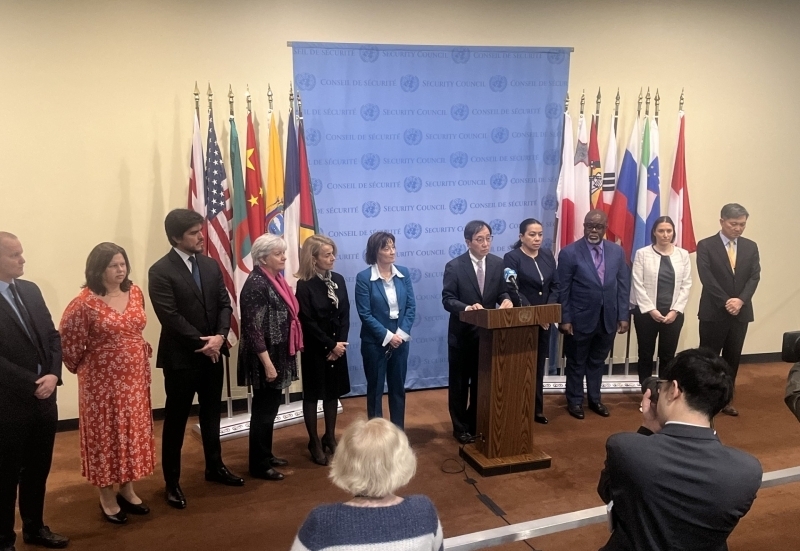紛争予防に関する安保理公開討論に際した女性・平和・安全保障共同コミットメント参加国による共同プレスステークアウト
令和6年3月13日

We, the Security Council signatories of the Shared Commitments for the principles of Women, Peace, and Security - Ecuador, France, Guyana, Malta, the Republic of Korea, Sierra Leone, Slovenia, Switzerland, the United Kingdom, the United States, and my own country Japan - reaffirm our strong commitment to ensuring the full, equal, meaningful, and safe participation of women at all stages of conflict prevention and their political, social and economic empowerment, in order to ensure their full representation at all levels of decision-making in the prevention of conflict and in all elements of peace making.
Despite our continued efforts, the world is faced with multiple conflicts which gravely endanger people’s lives. Conflicts tend to disproportionally affect women. Realizing a world where the human dignity of every individual is upheld and no one is left behind should be our common goal. To this end, achieving sustainable peace by preventing conflict and relapses into conflict is crucial.
Against this backdrop, today, the Security Council will hold an Open Debate on promoting conflict prevention through empowering all actors, especially women and youth. We will discuss challenges and opportunities in promoting participation of women in the prevention of conflict and its recurrence, as well as the importance of empowering them across a wide spectrum of activities in this endeavor.
Regrettably, women’s participation in conflict prevention is far from equal, meaningful, or safe. We believe more efforts need to be undertaken to recognize and elevate women’s engagement at all levels, to integrate gender equality, and to shape strategies based on the priorities of women’s rights constituencies in relation to conflict prevention and peacebuilding.
These areas include effective early warning systems to collect and analyze open-source information, preventive diplomacy and mediation, prevention efforts that tackle the root causes and drivers of conflict and violence, as well as robust and effective regulation of the arms trade, and electoral and security sector reforms, among others.
This underlines the necessity to build these areas on a gender-responsive analysis. Prevention measures cannot adequately predict and prevent conflict without a gender perspective. We cannot afford to leave half of the population out of the decision-making of conflict prevention.
We therefore urge Member States and all other stakeholders to reinforce and actively support women’s formal and informal conflict prevention efforts by creating safe and enabling environments for them, and to address threats, harassment, violence, and hate speech against them. We also urge them to ensure women’s full, equal, meaningful, and safe participation in national, regional and international organizations, as well as in informal, local or community-based processes charged with preventive diplomacy.
We also emphasize the importance of empowering and investing in women to ensure their active participation in conflict prevention efforts. In this regard, we underline that young, adolescent women and girls face unique challenges and circumstances. Support and empowerment initiatives must be tailored to their specific needs.
In conclusion, as we near the 25th anniversary of Resolution 1325, it is crucial to boost women’s full, equal, meaningful, and safe participation and their political, social and economic empowerment to make conflict prevention more effective. We remain fully committed to this effort.
